
Inefficient waste recovery in the fast-moving consumer goods (FMCG) and food and beverage sectors cost the Nigerian economy a staggering N3 trillion in fiscal losses yearly.
Also, Lagos State spends between N9 billion and N12 billion yearly on managing waste-related issues, including household disposal, street cleaning, dumpsite management and mitigating the impacts of floods, public health risks, loss of productivity and enforcement costs.
The figures were disclosed yesterday at the 12th West African Clean Energy and Environment (WACEE) Trade Fair and Conference 2024 held in Lagos. The Chief Executive Officer of Integritas Limited, Dr. Adebola Odunsi, who revealed the figures during his presentation titled, ‘From Waste to Wealth: Reimagine, Reuse and Reinvent’, highlighted the significant gap between waste generation and recovery, noting that most waste collection in Lagos still relies on manual methods, which are inefficient given the massive amounts of waste generated.
He said Lagos state generates between 13,000 and 15,000 metric tonnes of municipal solid waste daily, while the recovery rate remains at a low three to five per cent, leaving the state struggling to cope with its mounting waste problem.
Odunsi pointed out that the low recovery rate results in a daily generation of N400 million in the informal economy from PET plastics alone, noting that by increasing the recovery rate to 95 or 97 per cent, Lagos could tap into the $13 billion yearly circular economy industry.
He emphasised the need for a transformative approach to waste management in Lagos, driven by the city’s high levels of consumption and waste generation. Odunsi stressed that the rapid industrial production and urban consumption in Lagos are not being matched by efficient waste recovery systems, posing both environmental and economic challenges.
He proposed solutions within the circular economy framework, advocating for waste valorisation, which allows waste to be exchanged directly for value and tokenisation, which enables waste to be integrated into financial models, as pathways to converting waste into wealth.
The Consul General of the Federal Republic of Germany, Weert Börner, urged Nigeria to embrace renewable energy, resource efficiency and sustainable waste management as part of its long-term development strategy.
The Project Manager at the Competence Center for Energy and Environment, Delegation of German Industry and Commerce (DGIC) in Nigeria, Hillary Elegeonye, emphasised the importance of addressing Nigeria’s waste management challenges through education and new technologies that promote the circular economy.
He remarked that inadequate and improper waste management remains one of the country’s biggest challenges, with circular economy solutions offering a way forward.
Elegeonye further stated that the conference, attended by over 1,500 participants, including policymakers, industry experts and business leaders from countries such as Germany, Austria, and Ghana, alongside local Nigerian companies, focused on educating and showcasing innovative sustainability approaches while stimulating green economy investments in Nigeria.
The Delegate of the Delegation of German Industry and Commerce in Nigeria, Bastian Lidzba, highlighted the significance of fostering partnerships and innovation to drive sustainable green economy investments and development in West Africa.
He noted that energy is a critical issue in Nigeria and that the German government aims not only to increase access but also to address pressing environmental challenges through collaboration and investment in green technologies.






